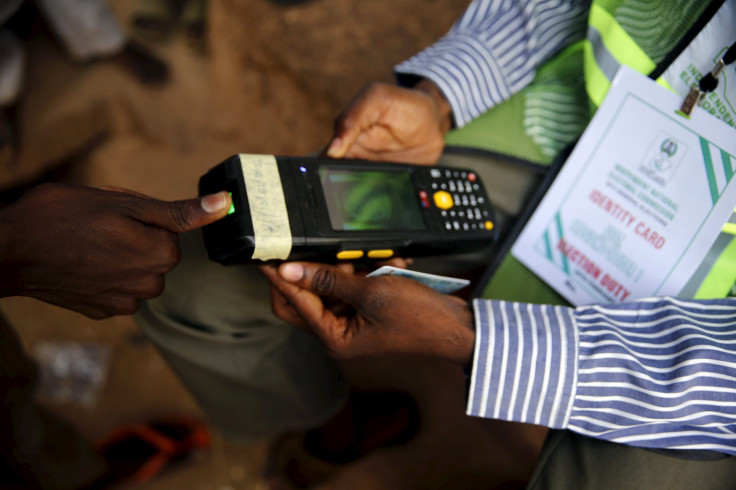Nigeria Decides 2015: Nigerian Elections Marked With Boko Haram Threats, INEC Hack And Card Reader Malfunctions But Voting Continues

Update, Saturday, 12:30 p.m. EDT: “Our House of Assembly candidate for Dukku in Gombe [state] has just been assassinated with seven other APC supporters,” Alhaji Lai Mohammed, a representative of the opposition All Progressives Congress party, told Reuters. In all, 15 people have been killed by unidentified gunmen close to polling stations during the general elections in Nigeria Saturday, the news agency reported.
Update, Saturday, 11:55 a.m. EDT: Nigeria’s Independent National Electoral Commission (INEC) reported via Twitter that the country’s elections in some areas will be conducted not only Saturday but also Sunday because of issues with the accreditation process, which may have been exacerbated by the heavy turnout of voters.
Original story:
Despite the continuing threat of Boko Haram, a high-profile website hack and some malfunctioning equipment, Nigerians are coming out en masse to vote in the national elections Saturday. The main event is the presidential race between incumbent President Goodluck Jonathan, 57, and his challenger Muhammadu Buhari, 72, in what is expected to be the closest election since the country transitioned to democracy from military rule in 1999.
At two polling stations in the northeastern states of Yobe and Gombe, Boko Haram militants opened fire on voters going inside, killing six people, according to Reuters. Earlier, insurgents entered towns on motorcycles and in pickup trucks, warning voters to leave the area or risk being killed, the Associated Press reported, citing witness accounts.
However, local reporters in other northern areas, even those previously ravaged by Boko Haram attacks, have documented long lines of citizens waiting for their turn to vote. Premium Times reporter Hamza Idris has reported that hundreds of internally displaced persons (IDPs) were lining up to vote in the city of Maiduguri, which was rocked by a Boko Haram suicide-bomb attack that killed at least 17 people this month.
RT @daily_trust: Internally Displaced People in Maiduguri in line for accreditation #NigeriaVotes Photo: Hamza Idris pic.twitter.com/fNvic0tQSq
- APC Nigeria (@APCNigeria) March 28, 2015Boko Haram has been carrying out increasingly violent attacks in Nigeria’s northeast since 2009. The Islamist militant group has killed more than 1,000 Nigerians in 2015 alone, and displaced more than a million of them overall.
Jonathan, who has been criticized for not being tough enough on the militants, cited Boko Haram security concerns as a major reason for the six-week delay of the national elections, which were initially scheduled for Feb. 14. His challenger, Buhari, a former military ruler, has earned popularity for his hardline approach to security and anti-corruption stance.
Since February, a multinational military force, including troops from neighboring Chad and Niger, have been taking back towns once controlled by the insurgents. In addition, the Nigerian government reportedly secured help from a group of highly skilled South African mercenaries.
The Nigerian military reported Friday it had “retaken” the city of Gwoza, believed to be a major base for Boko Haram.
FLASH: Troops this morning captured Gwoza destroying the Headquarters of the Terrorists self styled Caliphate. #NeverAgain
- DEFENCE HQ NIGERIA (@DefenceInfoNG) March 27, 2015Meanwhile, Nigeria’s Independent National Electoral Commission (INEC) reported via Twitter Saturday morning its website had been compromised by hackers calling themselves the Nigerian Cyber Army:
We are aware of the recent hack of our @inecnigeria website, we are currently investigating this incident #NigeriaDecides
- INEC Alert (@INECAlert) March 28, 2015The so-called Nigerian Cyber Army’s message has since been removed, but it reportedly contained an image of the Nigerian flag with a thumbprint in the middle, symbolizing the election, along with various warnings about vote-rigging.
“INEC dont try to rig because we have been watching you,” the message read, according to reports and screengrabs by local media outlets. “Dont be scared we mean no harm cos if you attempt to rig you will pay,” it continued, including a link to the hacker’s Facebook page.
If they like hack INEC website. The votes arent there... RT @ColinUdoh: INEC site hacked #NigeraDecides pic.twitter.com/izdsPW45xW"
- olanrewaju toki (@Drwhu_naija) March 28, 2015The issue has since been resolved, according to the INEC. And the agency has continued to solicit commentary from Nigerian voters about security at polling stations and any problems they encounter in the voting process using social media.
Common complaints seen on social-media sites include malfunctioning card readers and officials arriving late at polling stations. According to Bloomberg Business, the voting process was delayed at 31 percent of stations.
The election in Africa’s most populous country has drawn the attention of the entire continent and international community.
“Not only is the immediate political future of ‘Africa’s giant’ to be determined, but a major signal will be sent to the more than dozen-and-a-half other African countries which have polls scheduled over the course of the next year,” J. Peter Pham, head of the Atlantic Council’s Africa Center wrote in a recent op-ed piece for the Hill. “It is time for Nigerians to choose such a government and for their friends to support them in the effort.”
© Copyright IBTimes 2024. All rights reserved.






















